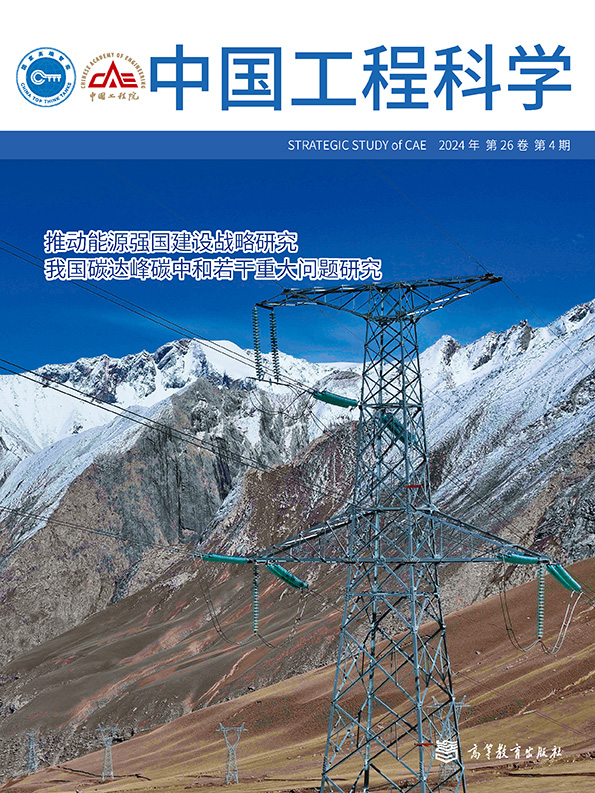Countermeasures for Assuring Water Ecological Environment Security in China
引用次数: 2
Abstract
: A good water ecological environment is crucial for the sustainable development and ecological civilization of China. However, various problems remain for China’s water ecological environment, including eutrophication, pollution of drinking water sources, contamination of groundwater and coastal waters, emerging pollutants, and shortage of ecological water. In this study, we analyzed the overall situation of the water ecological environment in China, pinpointed the major challenges, and proposed the strategic thinking and several basic principles. These principles focus on improving the water ecological environment and comprehensively consider water quality improvement, water ecological protection, and water environmental risk prevention and control. Three major scientific and technological projects were proposed pertaining to (1) coordinated governance and overall restoration of mountains, rivers, forests, fields, lakes, grasses, and sand in key basins, (2) overall improvement of water environment and water ecology in the Beijing‒Tianjin‒Hebei Collaborative Development Area, and (3) assurance of drinking water safety in the new era. Furthermore, we proposed the following four countermeasures: (1) revising the Environmental Quality Standards for Surface Water to strengthen its leading role in the construction of water ecological civilization in China; (2) evaluating the spatial and temporal differences of nitrogen and phosphorus nutrients in China’s lakes and implementing differentiated nutrients standards; (3) assessing the current status of water ecology in China and promoting water ecology monitoring and assessment; and (4) establishing an intelligent supervision platform for drinking water safety based on big data fusion.保障中国水生态环境安全的对策
良好的水生态环境对中国的可持续发展和生态文明至关重要。但中国水生态环境仍存在富营养化、饮用水源污染、地下水和近岸水域污染、污染物新出现、生态用水短缺等问题。本文分析了中国水生态环境的总体形势,指出了面临的主要挑战,提出了水生态环境治理的战略思路和基本原则。这些原则以改善水生态环境为重点,综合考虑水质改善、水生态保护和水环境风险防控。提出了重点流域山、河、林、田、湖、草、沙综合治理与整体修复、京津冀协同开发区水环境与水生态综合治理、新时代饮用水安全保障三大科技攻关项目。提出了以下四点对策:(1)修订《地表水环境质量标准》,强化地表水环境质量标准在中国水生态文明建设中的主导作用;(2)评价中国湖泊氮磷养分的时空差异,实施养分分异标准;(3)评价中国水生态现状,推进水生态监测与评价;(4)建立基于大数据融合的饮用水安全智能监管平台。
本文章由计算机程序翻译,如有差异,请以英文原文为准。
求助全文
约1分钟内获得全文
求助全文
来源期刊
自引率
0.00%
发文量
4428
期刊介绍:
"Strategic Study of CAE" is supervised by the Chinese Academy of Engineering, hosted by the Strategic Consulting Center of the Chinese Academy of Engineering and Higher Education Press Limited Company, and published by the Strategic Study of CAE Editorial Department. This journal is one of the "1+9+1" series of journals of the Chinese Academy of Engineering, and its editorial board is the Consulting Working Committee of the Chinese Academy of Engineering.
This bimonthly journal is published in Chinese. It is a core Chinese journal and a core journal of Chinese science and technology, included in the Chinese Science Citation Database (CSCD), the Japan Science and Technology Agency (JST) database, and the Swedish DOAJ database.
The journal is positioned as an academic journal for strategic consulting in engineering and technology, mainly publishing academic papers that reflect the results of strategic consulting research in China's engineering and technology. It aims to provide counsel for the government's scientific decision-making, guidance for the industry's scientific development, and references for related academic research.

 求助内容:
求助内容: 应助结果提醒方式:
应助结果提醒方式:


